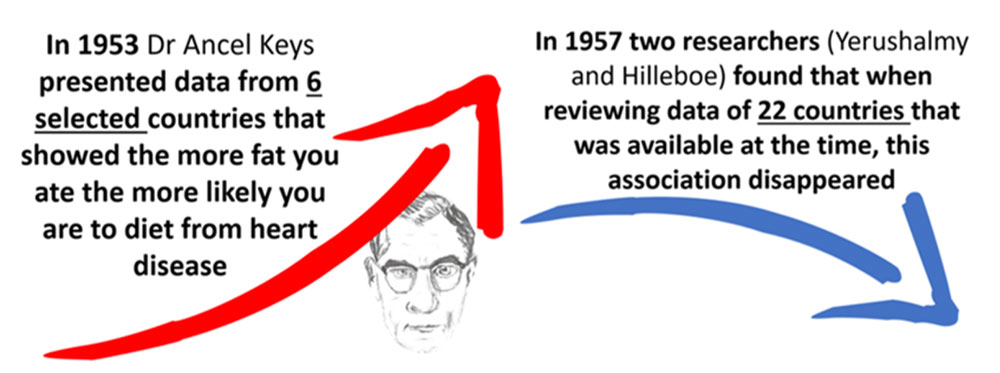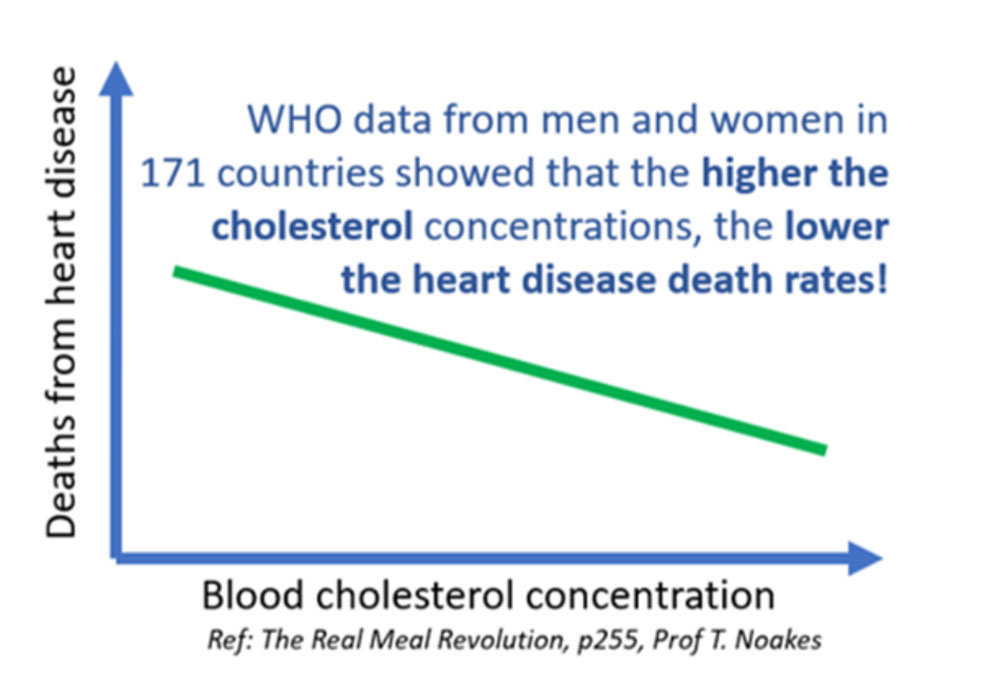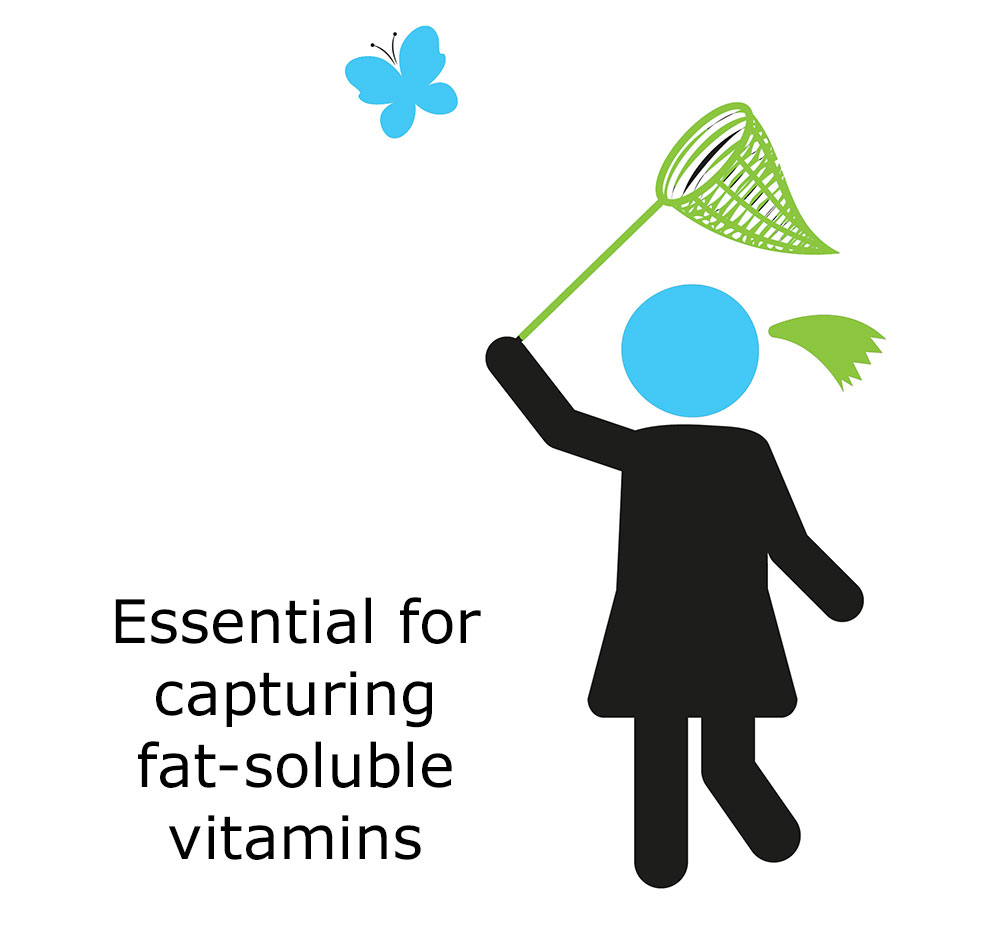Is fat good or bad

Written by Dr Estrelita van Rensburg
Introduction - is fat good or bad
Can you remember your parents telling you not to eat fat? The reason being that saturated fat will clog up your arteries and give you a heart attack. This line of thinking is known as the diet-heart or lipid hypothesis.
Sooner or later, it creates a vision in your mind that your arteries might resemble something like a clogged-up water pipe, leading to some people calling it the 'plumbing theory' of heart disease!
With this in mind, when thinking whether fats are good or bad, it is a surprise for most people to learn that there is no verifiable scientific evidence to prove this theory!
What started the fat diet-heart theory?
The ‘cholesterol and saturated fat heart disease’ idea gained prominence after the Second World War. It can largely be attributed to the American biochemist, Professor Ancel Keys from the University of Minnesota.
In the early 1950s he presented data from 6 countries which apparently showed a relationship between the amount of fat in the diet and heart disease rates. His conclusion was that by raising blood cholesterol concentrations, dietary fats clog the arteries of the heart, and must therefore be the direct cause of heart disease.
A few years later in 1957, two New York based researchers (Yerushalmy and Hilleboe), showed that the association between heart disease and fat disappeared when data from 22 countries were analysed.1 Their conclusion was that the consumption of fat and heart disease is not valid because there was no specific association between dietary fat intake and death from heart disease.
Today we know that there is an inverse relationship between the amount of saturated fat intake and the incidence of coronary heart disease. For example, countries like France and Switzerland where people have very high saturated fat intakes have the lowest rates of heart disease.
Interestingly, people in these countries often have high cholesterol levels - the Swiss are among the longest-living people in the world!
Back to Ancel Keys - cherry picking data to suit a particular theory is not good scientific practice! He undoubtedly was a powerful individual who actively targeted and undermined scientists who disagreed with him. So much so that this incorrect theory prevails in the minds of many up to the present time.

Government dietary guidelines - result of an incorrect theory
It was particularly reinforced in the minds of Americans and Europeans when their government’s dietary guidelines were introduced in the early 1980s. Their advice was to restrict dietary fat intake, and limit all fat intake to the low-fat variety.
Today, we are up against the powerful food and drinks industry, who intentionally use unsubstantiated scientific data to sell their low-fat products to the unsuspecting public.
Different kinds of fat, or rather fatty acids
The correct scientific term for fats is actually fatty acids. Fatty acids (see the figure below) are divided into saturated fats and unsaturated fats. Unsaturated fats are divided into monounsaturated fats and polyunsaturated fats.
Natural foods such as meat, fish, eggs and nuts all contain all types of fatty acids - saturated fats, monounsaturated fats and polyunsaturated fats. Interestingly, dairy products are the only food group that contain more saturated fats than unsaturated fats.
Contrary to common belief, the food with the highest amount of saturated fat is not found in animal products, but in a plant - coconuts. Coconut oil contains 90 percent saturated fat.
All the natural fats are healthy fats to eat and have very important functions in our body. For example, omega 3 fatty acids found in fatty fish, are very important for normal brain function, since it makes up 40 percent of the total brain fat content.
The situation is very different for omega 6 fatty acids since these compounds are found in vegetable oils and seed oils and are highly inflammatory in the body. These are 'manmade oils' - they are not natural products. Their production involves heavy industrialised processes such as mechanical and chemical extractions, bleaching and deodorising.
There has been a dramatic increase in the consumption of these products over the last century. These vegetable oils and seed oils are found in all processed foods (chocolate coatings, cake icings, sauces, creamy fillings etc). They also prolong the shelf life of products, sold as a plus point to the unsuspecting public. Very aggressive and successful marketing strategies ensured the widespread use of these products.
These hydrogenated oils contain trans fats - we all jumped on the bandwagon of eating margarine because we were told that it was much healthier than butter! Little did we know of how damaging these products are for our metabolic health. Trans fat margarine products are now banned in many countries.
Is cholesterol a good or a bad fat?
Notwithstanding the fact that most people believe that cholesterol is a saturated fat, it is not. It actually doesn't belong to the 'fat-family' of molecules, because its biochemical structure is completely different.
It is undeniably a very important molecule since both our liver and the brain synthesise it. It fulfils many important functions in the brain, including learning and memory formation.
It is also responsible for several other critical important functions such as the formation of hormones, including sex hormones, vitamin D production, the formation of bile acids and is an important component of our cell walls. Without cholesterol we will not be able to live.

The British obesity and nutrition researcher, Dr Zoe Harcombe, analysed data from the World Health Organisation for over 170 countries around the world, in order to see if there was any relationship between deaths from heart disease and blood cholesterol levels.2
The results were unequivocally clear. Quite the opposite of what was expected. As can be seen in the graph below, higher cholesterol levels were associated with lower death rates from heart disease!3

Why Statins if cholesterol is neither a fat, nor bad?
The first thing to remember is that the pharmaceutical industry started working on cholesterol-lowering drugs in the 1950s. It was at the time when Keys’ theory on fat and cholesterol received a lot of attention.
The drugs that were subsequently developed are called Statins. Their mode of action is to block the formation of cholesterol in the brain and the liver. The first to be released on the market was Lovastatin (Merck) in 1987.
In spite of the essential role of cholesterol in the body, and the fact that there is no verifiable scientific data to support the theory that high cholesterol values are responsible for coronary heart disease, these drugs are systematically prescribed by GPs and cardiologists when cholesterol values are found to be 'high'.
Prescription of Statin drugs is big business. Since its release, Statin usage exploded with total global sales reaching an estimated $1 trillion in 2020.

The Pharmaceutical industry is not keen to dwell on the serious side-effects associated with these drugs. To name a few, it can cause type-2 diabetes, increase blood pressure and heart disease, cause memory loss and disorientation, muscle pains, cataract development, neuropathy, cancer etc.
If your doctor suggests that you start using Statin medication to lower your cholesterol level, ask him/her to provide you with unbiased scientific information. In the first place, always ask for non-Pharma generated data.
Industry data by and large claims it reduces heart attack by 30 percent or higher. One thing to remember is that this kind of data is based on a relative risk analysis. In absolute terms, this usually means a less than 0.5 percent reduction of heart attack per year of treatment.4
With that in mind, it is up to each individual person to decide whether this treatment is appropriate for them.
Which are the good fats?
Natural fats such as saturated fat, monounsaturated fat and omega-3 polyunsaturated fats are indeed essential for normal body functions. These are the fats that we must eat.
Breast milk for instance is high in saturated fat and cholesterol. This shows the importance of these nutrients for the development of newborns. In addition to this, fat in unprocessed food (meat, fish, eggs, dairy products) is vital for normal immune function.
A third point is that both fat and cholesterol maintain the integrity of all our cells including the neurons in our brain.
A fourth point is that saturated fat is essential for the absorption of fat-soluble vitamins A, D, E and K. This does not happen if we eat low fat dairy products.
The best sources for vitamins A, K and D are animal-based products such as liver, eggs, dairy, oily fish, meat and cheese. These food products contain the vitamins in the best available format for our body to absorb and utilise efficiently.
Of all the fat-soluble vitamins, only vitamin E is naturally found in plant foods such as sunflower seeds and nuts.

Fats supply the most concentrated form of energy, boosting our energy levels. On top of that, it is also the healthiest form of energy because fats don't spike insulin levels, which are bad for our health in the long-term. To say nothing about the fact that fat in your diet helps make food palatable and is satiating (keeps you full longer).
Which fats are bad for us?
It is man-made fats, the polyunsaturated vegetable oils and seed oils as well as trans fats (margarine) - without a doubt. Examples of vegetable and seed oils include soybean oil, canola, corn oil and sunflower oils.
These unnatural fats were introduced into our food supply in the 1920s. A study published in 2011 estimated that the per capita consumption of soybean oil increased over a thousand-fold from 1909 to 1999 in the US.5
Vegetable oils and seed oils are used in salad dressings and cooking oils. They are also found in biscuits, breads, chips, ready-made meals, mayonnaise, frozen foods etc. When these oils are heated to high temperatures when preparing fried foods, they form compounds called aldehydes. Unfortunately, these compounds are linked to cancer, heart disease and dementia.

Fat - good or bad: it depends
The take away message in a word or two is that it depends on what kind of fat we are talking about. Natural fat contained in animal or plant-based food (coconut, avocadoes) is good, but the man-made polyunsaturated vegetable oil and seed oil varieties are toxic for our bodies. A healthy diet should always include healthy fats.
It is important to understand the difference in order to make the correct food choices. For more information and a strategy on how to implement this, see our COURSES link below.
References
- Yerushalmy J, Hilleboe HE. Fat in the diet and mortality from heart disease. A Methodological note. New Y State J Med.1957;57: 2343-2354.
- Harcombe Z, 2010, Cholesterol & heart disease – there is a relationship, but it’s not what you think. https://www.zoeharcombe.com/2010/11/cholesterol-heart-disease-there-is-a-relationship-but-its-not-what-you-think/
- Noakes T, Creed SA, Proudfoot J. The Real Meal Revolution. Robinson, UK, 2015.
- Kendrick M. The Great Cholesterol Con: The Truth About What Really Causes Heart Disease and How to Avoid It. London, UK: John Blake; 2007.
- Blasbalg TL, Hibbeln JR, Ramsden CE, Majchrzak SF, Rawlings RR. Changes in consumption of omega-3 and omega-6 fatty acids in the United States during the 20th century. Am J Clin Nutr. 2011;93(5):950-962.

